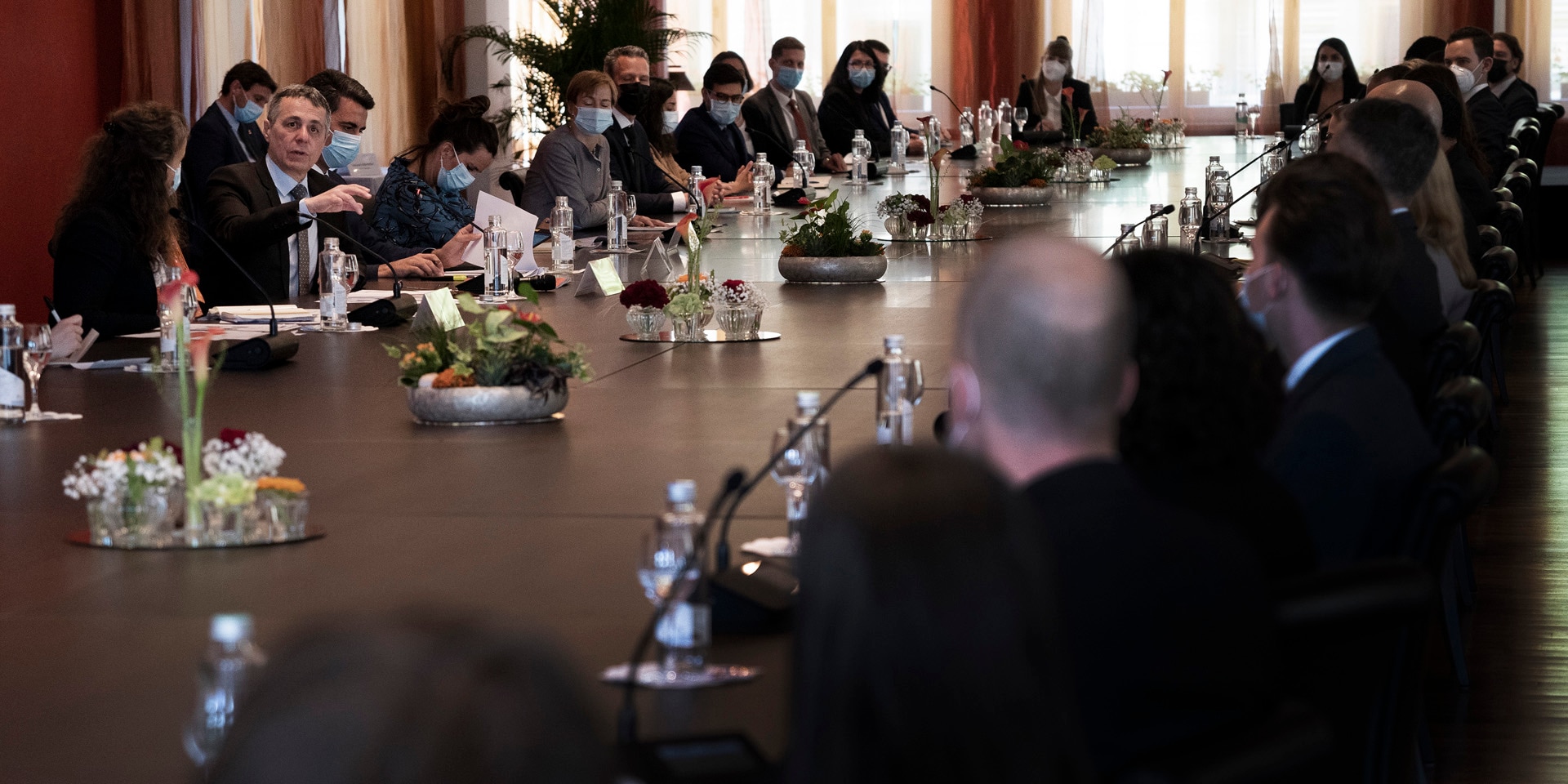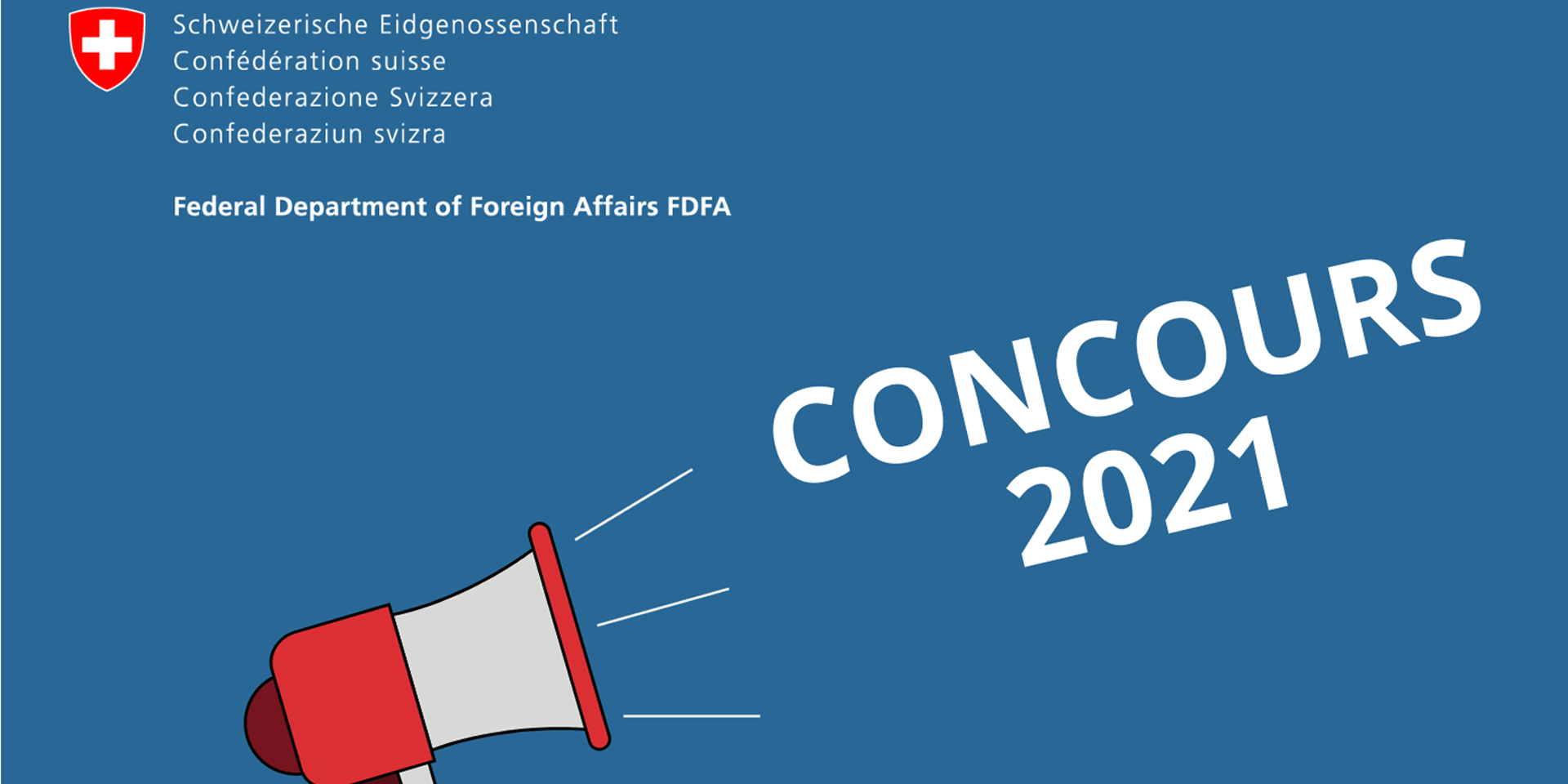Career paths: a region of the world and the climate in the training focus
Tomorrow the four corners of the globe. Today Bern. The theoretical training of the Federal Department of Foreign Affairs' future transferable staff is coming to an end after two intensive months. Climate diplomacy and the Middle East and North Africa Strategy are at its heart.

Candidates for FDFA career paths meet with the head of the FDFA Ignazio Cassis on 25 May in Bern. © FDFA
Daily professional life is punctuated by foreign policy, global challenges and the uncertainties thrown up by current events. The office alternates between Bern and one of the Swiss representations in 100 or so countries.
This is the reality for the over 1,000 people who pursue one of the three FDFA career paths: diplomacy; international cooperation; or consular affairs, operations management and finance.
The 57 new career path candidates are currently in the midst of their training, which lasts 15 months in total, consisting of a two-month theoretical part followed by practical training through an internship in Bern or abroad.
A thorough knowledge of the FDFA, its actors, the areas of work, instruments and processes is crucial before taking up a post.
Dialogue and flexibility
The training is tailor-made with the different directorates within the department. The world is changing fast and every career path has its challenges. Swiss foreign policy also has its own specific strategies and objectives.
"The format of the training courses for candidates evolves each year," explains Sandra Witschi, who is in charge of Education and Training at the FDFA.
"We are constantly adapting to current issues and needs in the field. The COVID-19 crisis has contributed to the digitalisation of the modules, giving us more flexibility. For the first time, webinars will be offered during the practical training.
5 MENA objectives in 7 days
In April, a seven-day virtual module was devoted to the FDFA's first geographic strategy, the Middle East and North Africa (MENA) Strategy for the period 2021–24.
The strategy is complex, covering 18 countries of importance to Switzerland, from Morocco to Iran.
"The FDFA is no longer the only federal department active abroad. The MENA Strategy sets out the priorities for all federal government actors in the region. It is an important tool for balancing Switzerland's various interests and values on a daily basis," says Angelica Schempp, regional coordinator for the Arabian Peninsula and Iran at the FDFA and head of the module.
"Candidates were introduced to the five thematic priorities of the strategy – one each day. We wanted to present the opportunities and risks associated with the MENA region, without neglecting the fact that sometimes conflicting objectives exist. The aim of the module was also to present ways of cooperating between the different services within the Federal Administration and with external actors, such as NGOs.
"A special accent was placed on making the module interactive. The candidates appreciated the various exchanges with the ambassadors and other Swiss representatives in the region and the numerous role-playing exercises."
Climate diplomacy in the run-up to COP26
The implementation of the 2030 Agenda and global environmental and climate protections are of crucial importance to Switzerland.
In order to show the links between current events, the theme and the work, a 'climate diplomacy' webinar will be offered to candidates before the 26th COP, the Conference of the Parties to the United Nations Framework Convention on Climate Change, which will take place in November.
"Climate change is one of the biggest global challenges. Climate issues have an impact on our environment, our economy, our societies, the security of our populations and peace," explains Yvan Keckeis of the FDFA's Prosperity and Sustainability Division.
"We will raise awareness of the theme among the candidates, discuss security issues, and national and international climate policies. Practical exercises will also be offered," he adds.
A wide range of professionals
Implementing Switzerland's foreign policy depends on qualified, competent professionals. The FDFA has some 6,000 employees in Bern and its representations, working in a wide range of functions. In addition, the FDFA takes on numerous academic interns each year in Switzerland and abroad.
The FDFA has been running a social media campaign this week to showcase the work of several academic interns working in the FDFA State Secretariat.
Links
- Transferable career paths at the FDFA (ger, fr, it)
- Diplomatic career path (ger, fr, it)
- Consular affairs, management and finance career path (ger, fr, it)
- International cooperation career path (ger, fr, it)
- Working for the FDFA (ger, fr, it)
- Swiss foreign policy: strategies and key aspects, FDFA
- Foreign Policy Strategy 2020–23, FDFA
- MENA Strategy, FDFA
- 2030 Agenda for Sustainable Development, FDFA

